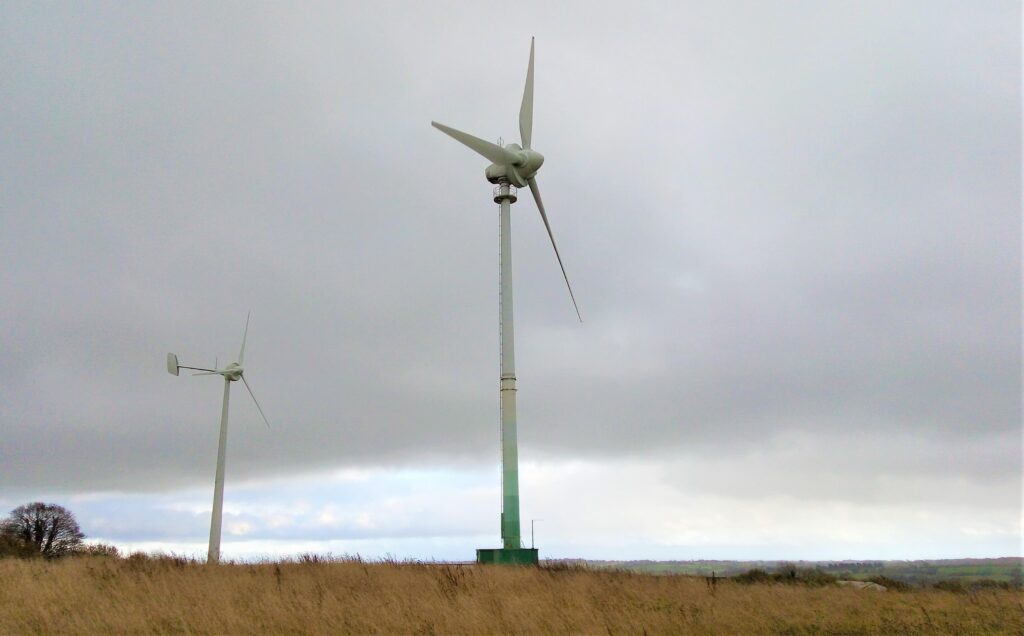“Etch out a future of your own design, well-tailored to your needs, yeah. Windpower.”
Windpower by Thomas Dolby

Our warming climate is directly linked to the amount of carbon we’re putting into our world’s air. Our target is to reach net-zero carbon (creating no more carbon than the world can soak up safely) as soon as possible, to escape the worst consequences of a hotter Earth.
- Driving a reasonably efficient regular car (52 mpg) 12,000 miles a year (commuting Minchinhampton to Swindon for your job, say) causes about 3.3 tonnes of carbon a year.
- A ready-meal reliant meat-eater who isn’t fussy about where in the world their food comes from or about not leaving left-overs probably causes about 2.8 tonnes of carbon a year.
- A single return flight to Italy – to go to a match, on a stag do, a school trip – is 1 tonne of carbon.
(There are lots of easy calculators you can use to measure your own carbon footprint, we used Carbon Independent.)
In Minchinhampton parish, the average household causes around 21.1 tonnes of carbon a year. 7.18 tonnes in goods and services, 5.49 tonnes in household energy, 4.12 in food, 4.07 in travel, and 0.24 in waste. (Numbers from the IMPACT community carbon calculator.)
The question is how to cut all that carbon. There’s only so much we can do to control our own lives – the food we eat, the ways we travel, the electronic-plastic gadgets we buy…), at some point we have to think bigger.
When we had our founding public meeting in March 2020 we asked for ideas for what to focus on. Joint second on the list suggested was green energy generation, and particularly wind power.
About wind turbines
People object to wind turbines because of how big they look, but it wasn’t that long ago that the Kearsey windmill turned on Windmill Road in Minchinhampton. We have history with wind power around here. If you saw it from Minchinhampton High Street, a 100m turbine in the far east of the parish would look smaller than a 2p piece held at arm’s length.
A big benefit of turbines is that they take up so little ground space: they can generate an enormous amount of clean energy on a very small area of land. The solar farms we see need much more space, and don’t generate on winter evenings, when demand is highest.
Wind turbine power grows with the cube of the wind-speed: three times windier; twenty-seven times better. The power grows with the square of the blade length, too: three times longer; nine times better.
Wind turbines are problematic to construct because of planning and ecological issues, and the difficulties in getting such large blades on-site.
Why this survey?
The most known wind turbine locally is probably Lynch Knoll, west of Nailsworth on the Nympsfield Road. This is 62m high. Lynch Knoll is about 3.5 miles from Minchinhampton, 2.1 from St Chloe, 2.6 from Box.
A single 100m turbine could generate 2.5MW of electricity. Not quite enough for Amberley; more than enough for Burleigh.
In Stroud District there are potentially 18 areas where average wind speeds and isolation from houses, roads, protected habitats and other concerns point to potentially good conditions for a 100m wind turbine. The eastern part of our parish is one of those.
We want to know how you feel about our having wind turbines of this size around there.
If you live in or around Minchinhampton Parish (your postcode starts GL52, GL55, GL68, or GL69), then please fill out this survey. It has 10 questions. Mostly it’s ticking boxes, and the whole thing shouldn’t take more than 10 minutes.
You don’t have to give us your name, and you don’t have to answer any question you don’t want to.
If you prefer to fill in a paper version, there’s a pdf on our rudimentary info page. Thank you!
0 Comments